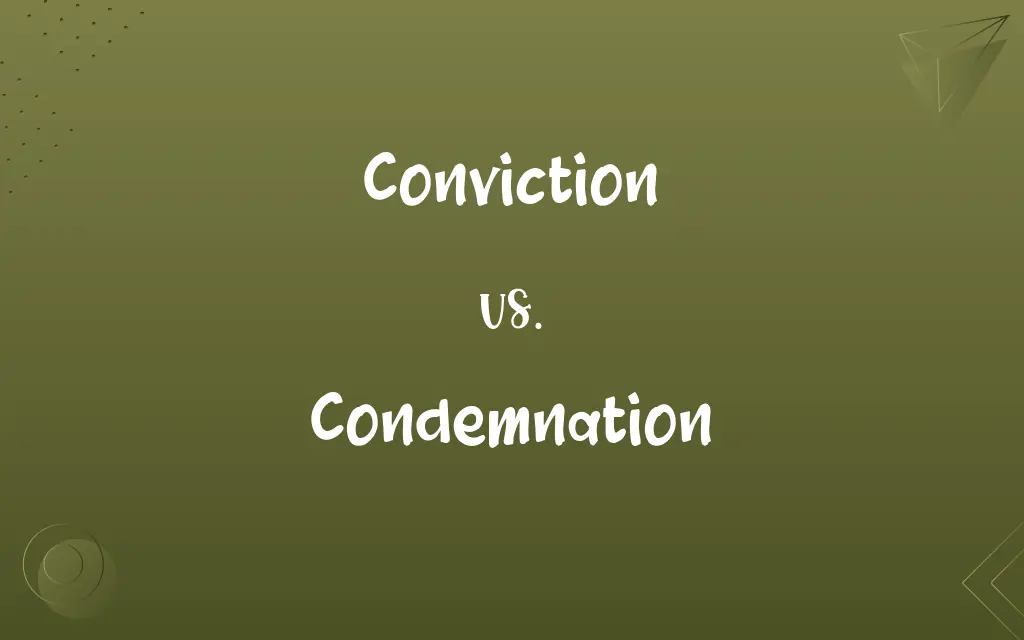Conviction vs. Condemnation: Know the Difference

By Hifza Nasir & Dua Fatima || Published on November 1, 2024
Conviction is a firmly held belief or opinion, while condemnation is the expression of strong disapproval or the act of sentencing someone to a punishment. Conviction is internal; condemnation is often external.

Key Differences
Conviction refers to a strong belief in something with a sense of certainty, often without the need for external approval. It's a personal adherence to specific truths or principles. For example, someone might have a deep conviction about the importance of honesty. Condemnation, on the other hand, involves expressing strong disapproval towards actions, behaviors, or ideas. It can also mean the legal process of declaring someone guilty of a crime, leading to their sentencing.
Dua Fatima
Nov 01, 2024
Conviction is rooted in personal belief and moral certainty, condemnation is about rejecting or denouncing something or someone, often publicly. Convictions can inspire positive actions based on personal values, whereas condemnation is typically associated with negativity or criticism towards something deemed wrong or unacceptable.
Hifza Nasir
Nov 01, 2024
Conviction and condemnation can intersect in the context of justice, where a legal conviction (a formal declaration of guilt in court) can lead to condemnation (sentencing). However, outside the legal framework, convictions motivate personal growth and actions, whereas condemnation aims to censure or penalize.
Dua Fatima
Nov 01, 2024
The power of conviction lies in its ability to drive individuals to stand firm on their beliefs and principles, even in the face of opposition. It's an internal force for moral or ethical standing. Condemnation, by contrast, seeks to isolate and repudiate actions, decisions, or beliefs that are considered harmful or unethical.
Hifza Nasir
Nov 01, 2024
Conviction is about holding onto one's beliefs with confidence and strength, often leading to personal or societal improvement. Condemnation is about expressing disapproval or punishing what is considered wrong, aiming to deter negative behaviors or attitudes.
Dua Fatima
Nov 01, 2024
ADVERTISEMENT
Comparison Chart
Legal Association
Declaration of guilt in court
Sentencing or expressing disapproval
Hifza Nasir
Nov 01, 2024
ADVERTISEMENT
Conviction and Condemnation Definitions
Conviction
Strong belief.
Her conviction in the value of hard work led to her success.
Hifza Nasir
Feb 28, 2024
Condemnation
Expression of disapproval.
The public's condemnation of the policy was loud and clear.
Dua Fatima
Feb 28, 2024
Condemnation
Moral denouncement.
The act received widespread condemnation from the community.
Dua Fatima
Feb 28, 2024
Conviction
Moral certainty.
His conviction about environmental conservation drives his actions.
Hifza Nasir
Feb 28, 2024
ADVERTISEMENT
Condemnation
Legal sentencing.
His condemnation to five years in prison was controversial.
Hifza Nasir
Feb 28, 2024
Conviction
Firm opinion.
She held a deep conviction that education can change lives.
Hifza Nasir
Feb 28, 2024
Condemnation
Critical judgment.
Her condemnation of the company's ethics sparked debate.
Dua Fatima
Feb 28, 2024
Conviction
Personal principle.
His convictions about honesty guide his business practices.
Dua Fatima
Feb 28, 2024
Condemnation
Denunciation of actions.
The leader's actions faced condemnation from the international community.
Dua Fatima
Feb 28, 2024
Condemnation
The act of judicially condemning, or adjudging guilty, unfit for use, or forfeited; the act of dooming to punishment or forfeiture.
Hifza Nasir
Feb 27, 2024
Condemnation
The act of condemning or pronouncing to be wrong; censure; blame; disapprobation.
In every other sense of condemnation, as blame, censure, reproof, private judgment, and the like.
Hifza Nasir
Feb 27, 2024
Condemnation
The condition of being strongly disapproved of;
He deserved nothing but condemnation
Hifza Nasir
Feb 27, 2024
Repeatedly Asked Queries
What is conviction?
Conviction is a firmly held belief or a legal declaration of someone's guilt.
Dua Fatima
Nov 01, 2024
What does condemnation mean?
Condemnation can refer to the expression of strong disapproval or a legal sentence to punishment.
Hifza Nasir
Nov 01, 2024
Is condemnation always negative?
While it often carries a negative connotation, condemnation can also serve as a tool for societal correction.
Shumaila Saeed
Nov 01, 2024
Can condemnation lead to positive change?
Yes, when used constructively, it can highlight wrongdoings and encourage better choices.
Shumaila Saeed
Nov 01, 2024
How do conviction and condemnation differ in a legal context?
Legally, conviction is finding someone guilty, while condemnation is the sentencing that follows.
Hifza Nasir
Nov 01, 2024
Can someone have a conviction without expressing condemnation?
Yes, one can hold strong beliefs (conviction) without condemning others.
Hifza Nasir
Nov 01, 2024
How does personal conviction impact behavior?
Personal conviction drives actions aligned with one's beliefs and principles.
Hifza Nasir
Nov 01, 2024
What is the impact of public condemnation?
It can lead to social ostracization, legal consequences, or a push for change.
Hifza Nasir
Nov 01, 2024
How is condemnation expressed in society?
Through public disapproval, legal sentencing, or moral denouncement.
Shumaila Saeed
Nov 01, 2024
What role does conviction play in personal growth?
It motivates individuals to act according to their values, leading to self-improvement.
Dua Fatima
Nov 01, 2024
How does condemnation affect an individual's reputation?
It can damage one’s reputation, leading to social and professional repercussions.
Shumaila Saeed
Nov 01, 2024
Can a person's convictions change over time?
Yes, as individuals gain new experiences and insights, their convictions can evolve.
Hifza Nasir
Nov 01, 2024
Why is conviction important in leadership?
It provides a firm foundation for decisions and actions that inspire trust and respect.
Hifza Nasir
Nov 01, 2024
What distinguishes conviction from personal opinion?
Conviction is a deeper, more firmly held belief that often dictates actions, unlike a mere opinion.
Dua Fatima
Nov 01, 2024
In what situations is condemnation justified?
When actions or behaviors are harmful, unethical, or illegal, condemnation can be a justified response.
Shumaila Saeed
Nov 01, 2024
Share this page
Link for your blog / website
HTML
Link to share via messenger
About Author
Written by
Hifza NasirCo-written by
Dua Fatima






































































